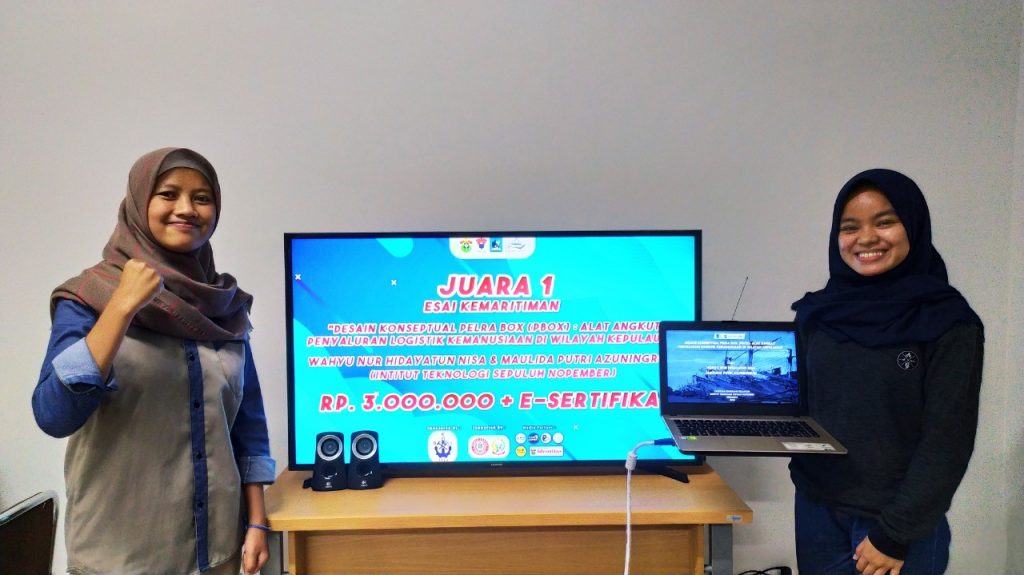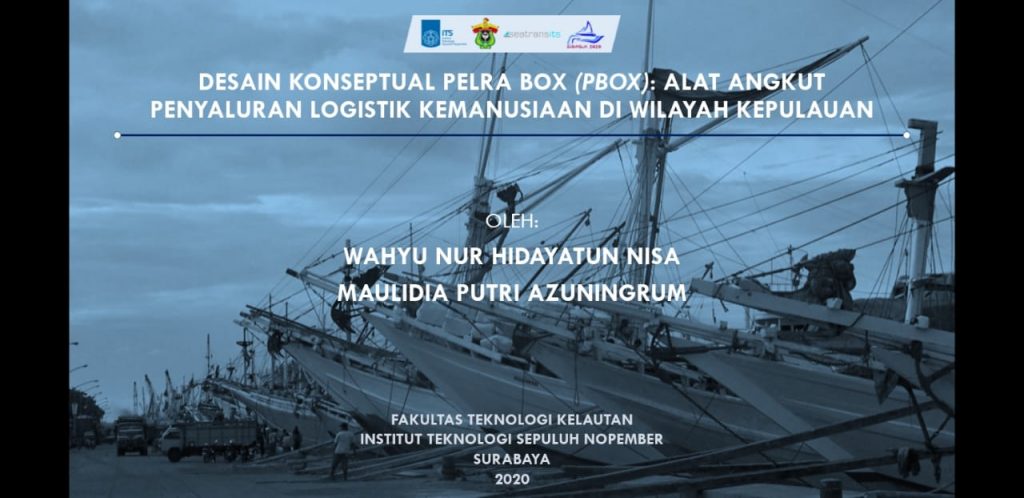Through PBOX, ITS Students Help Distribute Humanitarian Logistics
ITS Campus, ITS News – The current Covid-19 pandemic is not an obstacle to innovating. As did by two students of Institut Teknologi Sepuluh Nopember (ITS) who made Pelra Box innovation (PBOX), in the form of transport for the distribution of humanitarian logistics in the archipelago.
The two students are Wahyu Nur Hidayatun Nisa and Maulidia Putri Azuningrum. Through a competition themed on the Role of Maritime Affairs to Realize Intellectual Indonesians During the Pandemic, students of the Department of Marine Transportation Engineering (DTTL) presented an essay titled Conceptual Design Pelra Box (PBOX): Transportation Tool for Humanitarian Logistics Distribution in the Archipelago.
Wahyu said PBOX is a tool made of wood and melamine triplex that has functioned as a container. PBOX can be folded when empty, so it can make the operation easier because it does not take up space when empty. “The use is the same as a regular container, it’s just that in the design we bring it’s smaller and lighter,” she said.

(From left) Wahyu Nur and Maulidia Putri in the announcement of the Winner of the Maritime National Competition (KONKA) 2020
According to Wahyu, the idea to make the innovation started from the spread of coronavirus in Indonesia that never subsided and spread throughout the country, no exception in the archipelago. So it is very important to do the equalization of comprehensive humanitarian logistical assistance to all corners of the country.
Before the pandemic, all kinds of needs for the archipelago were channeled by sea from Java to major ports outside Java. It is then channeled by a smaller boat to the smaller islands. “This is because not all areas in Indonesia can be supported large ships berthing (containers or general cargo), especially small islands,” explained Wahyu.
In addition to not having a port to berth on, she continued, the depth of its waters also does not allow for large ships to cross. So that’s quite time-consuming. “Because humanitarian logistical assistance should be brought in quickly, but not all areas can support the large ships,” Wahyu said.
So, she added, to meet the needs or bring logistical assistance the people using the Boat have a short draft. Therefore, The Pelra Ship is expected to be a solution to solve the problem.
However, Putri continued, There are still some problems, ranging from the size to the capacity of the loading and unloading equipment owned. “Also, the use of this people’s ship also has a high chance of damage and loss of cargo,” explained Putri.

Overview of innovation ideas by two students of the Department of Marine Transportation Engineering ITS who won the first place of the KONKA 2020 essay competition
Looking at these conditions, this PBOX innovation was designed. Based on its functionality, PBOX will be able to minimize damage and load loss by up to 1.5 percent and speed up the unloading process 25 percent of the total existing time.
This result is obtained from comparing between the calculation of the level of damage and the loss of the charge of the existing condition and after the innovation. In existing conditions there is a rate of damage and loss of charge with an average of 1.5 – 8 percent. “After this innovation, the loss of cargo is almost non-existary because all goods have been containerized since before the goods arrived at the port,” explained Wahyu again.
Also, added Wahyu, the demands of short lead-time characteristics in terms of humanitarian logistics lead to the need for efficiency of cargo handling. Especially in the process of unloading if with this innovation process that will be faster up to 25 percent of existing conditions.
The Wahyu said that PBOX has a size of 1.5 x 1 x 1 in meters. This tool is calculated to be able to be filled with 180 kilograms (equivalent to 12 boxes of food/assistance). “It is predicted to have an economic lifespan of one year,” she said.
PBOX innovation has been recognized nationally, proven when competing in the maritime essay competition in the National Maritime Competition (KONKA) 2020, this idea managed to win the first place. Wahyu and Putri managed to show off their idea in a competition held by Hasanuddin University, early September.
Not only technically, Wahyu and Putri also hope that PBOX can play a role in supporting health protocol policies during the Covif-19 pandemic by minimizing transmission through contact between payloads – disinfectants, payloads – Unloading Workers (TKBM), and fellow TKBM.
Hopefully in the future, this design can be refined from materials suitable for use, strength, and others. Then a prototype was made to be tested in the field, so that it could be known the feasibility of this innovation in real time. “The hope is also that scientific activities like this can be followed by more students in order to fill their spare time during the pandemic,” she concluded. (naj/rev/ITS Public Relations)
Related News
-
Facilitating Creativity of Students, ITS Information Systems Department Presents CCWS
ITS Department of Information Systems students conduct a discussion in one of the available spaces in the ITS Digital
September 21, 2020 23:09 -
ITS Explores Electrification Cooperation with PT Vale Indonesia
ITS Campus, ITS News — Following up on the Memorandum of Understanding (MoU) with PT Vale Indonesia, Institut Teknologi
September 21, 2020 23:09 -
ITS Reaches Top 7 BRIN Collaborators with 309 Scientific Publications
ITS Campus, ITS News — Institut Teknologi Sepuluh Nopember (ITS) continues demonstrating its commitment to strengthening collaboration in research
September 21, 2020 23:09 -
The Only One from Indonesia, ITS Student Becomes Erasmus+ Scholarship Awardee
ITS Campus, ITS News — Civitas academica of Institut Teknologi Sepuluh Nopember (ITS) has once again contributed to making
September 21, 2020 23:09
